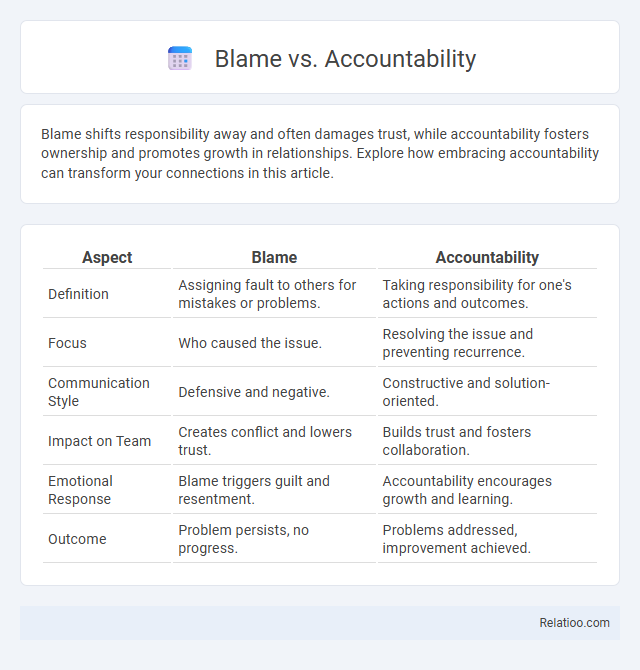Blame shifts responsibility away and often damages trust, while accountability fosters ownership and promotes growth in relationships. Explore how embracing accountability can transform your connections in this article.
Table of Comparison
| Aspect | Blame | Accountability |
|---|---|---|
| Definition | Assigning fault to others for mistakes or problems. | Taking responsibility for one's actions and outcomes. |
| Focus | Who caused the issue. | Resolving the issue and preventing recurrence. |
| Communication Style | Defensive and negative. | Constructive and solution-oriented. |
| Impact on Team | Creates conflict and lowers trust. | Builds trust and fosters collaboration. |
| Emotional Response | Blame triggers guilt and resentment. | Accountability encourages growth and learning. |
| Outcome | Problem persists, no progress. | Problems addressed, improvement achieved. |
Understanding Blame and Accountability
Understanding blame involves identifying who is responsible for a mistake or failure, often leading to negative judgment and conflict. Accountability emphasizes the assumption of responsibility with a focus on corrective actions and learning from errors to improve future outcomes. Distinguishing between blame and accountability encourages constructive problem-solving and fosters a culture of transparency and trust within teams.
Key Differences Between Blame and Accountability
Blame assigns fault and often leads to defensiveness and stagnation, while accountability emphasizes responsibility and encourages proactive problem-solving and growth. Accountability involves owning outcomes and learning from mistakes, promoting a culture of trust and continuous improvement. Blame centers on past errors without fostering constructive change, whereas accountability focuses on future actions and solutions.
The Psychology Behind Blame
Blame often triggers defensive behavior and emotional distress, hindering personal growth and problem-solving. Understanding the psychology behind blame reveals its roots in fear and the need to protect self-esteem, which contrasts with accountability that fosters responsibility and constructive change. Shifting your mindset from blame to accountability can improve relationships and promote a healthier, more productive environment.
The Role of Accountability in Growth
Accountability drives personal and professional growth by fostering responsibility and encouraging learning from mistakes, unlike blame which often leads to defensiveness and stagnation. Emphasizing accountability cultivates a growth mindset, enabling individuals to analyze errors constructively and implement effective solutions. This proactive approach leads to improved performance, stronger team dynamics, and continuous development.
Blame Culture: Consequences in Teams
Blame culture in teams undermines trust, stifles innovation, and increases employee stress, leading to decreased productivity and higher turnover rates. When team members fear blame, they are less likely to take risks or admit mistakes, which hampers learning and problem-solving. Shifting from blame to accountability promotes psychological safety, encourages ownership, and drives positive performance outcomes.
Accountability: Building Trust and Ownership
Accountability fosters trust by encouraging individuals to take ownership of their actions and outcomes, creating a culture where learning and improvement thrive. Unlike blame, which often leads to defensiveness and mistrust, accountability promotes transparent communication and shared responsibility, empowering you to contribute positively to team success. Emphasizing accountability strengthens relationships and drives consistent performance through mutual respect and reliability.
Shifting from Blame to Accountability in the Workplace
Shifting from blame to accountability in the workplace enhances team collaboration by fostering a culture of ownership and continuous improvement. Emphasizing accountability encourages employees to take responsibility for their actions and outcomes, leading to increased trust and productivity. This approach minimizes defensiveness and promotes problem-solving, which strengthens overall organizational performance.
Strategies to Foster Accountability
Fostering accountability requires cultivating a culture where individuals take ownership of their actions and outcomes without fear of unfair blame. Your organization can implement clear expectations, transparent communication, and constructive feedback mechanisms to encourage accountability. Emphasizing solutions and learning from mistakes ensures that responsibility leads to growth rather than resentment.
Overcoming Challenges in Accountability Adoption
Overcoming challenges in adopting accountability requires shifting organizational culture from blame-focused reactions to constructive responsibility. Developing clear expectations, transparent communication, and supportive leadership fosters an environment where employees feel safe to take ownership and learn from mistakes. Empowering teams with feedback mechanisms and recognizing accountability efforts enhances engagement and drives sustained performance improvement.
Long-term Benefits of Choosing Accountability Over Blame
Choosing accountability over blame fosters a culture of continuous improvement and trust, leading to sustainable organizational growth. Accountability encourages learning from mistakes and proactive problem-solving, which enhances employee engagement and reduces turnover rates. Over time, this approach drives higher productivity and innovation by empowering individuals to take ownership of their actions without fear of unjust criticism.

Infographic: Blame vs Accountability
 relatioo.com
relatioo.com